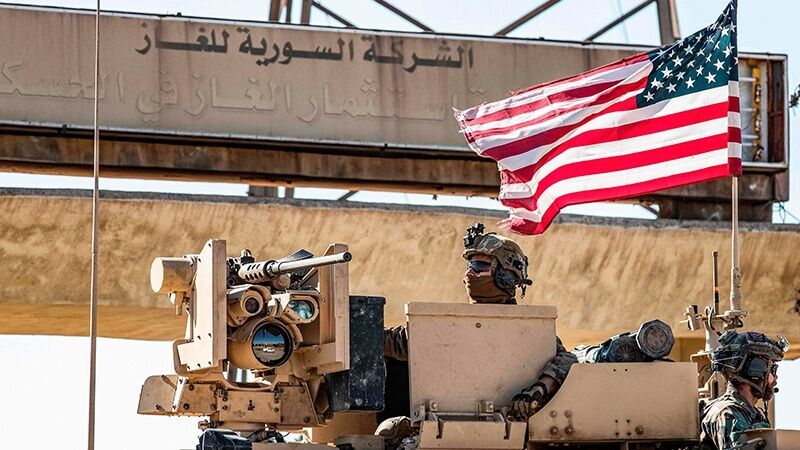Seyyed Nasrollah Ebrahimi told the Strategic Council on Foreign Relations that the US government claims that the presence of its forces in Syria is based on the principle of humanitarian intervention, human rights principles and the principle of responsibility of support.
“Unfortunately, the US government has applied double standards in the past and has misused the principles of human rights and humanitarian intervention in other countries of the region such as Iraq and Afghanistan,” he said, referring to the reasons and excused behind the presence of the US and other occupiers in Syria.
He added that the US government and other occupiers cite the declared policy of the war on terrorism and claim that the presence of their forces in the soil of Syria is for the fight with global terrorism which all the countries of the region may be overshadowed by this policy.
He added that the US government claims that it has taken the permission of local tribes and Syrian Kurds for its presence in Syria and therefore its presence in the Syrian soil is totally legal and legitimate. The US government has claimed that it does not consider itself obliged to obtain a legal permit for its presence in Syria as it does not recognize the legitimate government of Syria. This is while it is not acceptable.
Violation of the indisputable principles of the international law
Ebrahimi explained that “in terms of the international law, it should be announced without doubt that the status of the presence of the US and Turkey in Syria is considered occupation as such presence is not based on a bilateral treaty between the two countries and or the request of the Syrian government. Moreover, the legal permit of the United Nations Security Council has not been obtained for intervention in this country.”
This expert of international law issues referred to the illegal presence of the military forces of the United States and Turkey in Syria as described by the government of Bashar al-Assad, saying this presence lacks political and legal legitimacy.
“The presence of American and Turkish forces in the soil of Syria is the violation of the absolute principles of general international law as enshrined in the Charter of the United Nations such as the principle of non-intervention in other countries and the principle of respect to the sovereignty of other countries, the principle of equality of governance. It is also in contravention of internationally-recognized and binding conventions.”
He added that Damascus has announced several times that the intervention of the United States and Turkey in Syria is in violation of the Charter of the United Nations and numerous resolutions issued by the UN such as General Assembly Resolution 2131, Resolution 2625 and Resolution 36/103 Year 1981.
Violation of the decisions of the International Court of Justice
Ebrahimi said “moreover, the government of Syria has officially announced the presence of the United States in Syria violates the decisions and verdicts of the International Court of Justice. In this respect, we can cite the case of Nicaragua vs the United States in 1986 in which the US was denounced due to interference in the domestic affairs of Nicaragua and arming rebels in that country.”
This professor of the University of Tehran said it seems that as against the declared claim, the presence of the United States and other occupiers in Syria is aimed at controlling Syria’s oil-rich areas and securing their special interests.
Asked about international solutions to evict occupiers from Syria and the help of countries of resistance front to the lawyers of this country, he said there is no permit in practice for their presence in Syria and this presence does not enjoy legal and lawful legitimacy.
He explained that “given the decision of the United States on the presence of American advisors in Iraq and the withdrawal of military forces from this country by the end of the present year, and also the withdrawal of American forces from Afghanistan, it does not seem that the US government could stay long in Syria especially that the strong presence of the resistance movement in Lebanon, Syria and Iraq would impede the prolonged presence of occupying forces in the region and particularly in Syria.”
Tightened hands of the international law
This analyst of international legal issues added that “on one hand, due to extensive structural weaknesses in international law especially in the United Nations and the Security Council, it should be unfortunately said that from the legal point of view, no file can be claimed against the occupiers in the International Court of Justice and await a positive and successful outcome; on the other hand, Syria has not admitted the mandatory competence of the International Court of Justice so as to be able to file a complaint whatever weak against the intervention of occupiers in Syria.”
Ebrahimi added that in the complaint of Syria against the US government in the Security Council of the United Nations, it seems there is no benefit for Syria because the US government has veto power and any decision in the Security Council against the presence of the US in Syria shall be vetoed. However, given the responsibility of the United Nations against the occupiers, the interaction between the government of Syria and independent powers and relatively independent members of the United Nations and resort to the General Assembly of the United Nations would be effective against the occupiers.










0 Comments